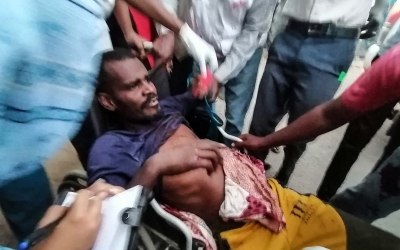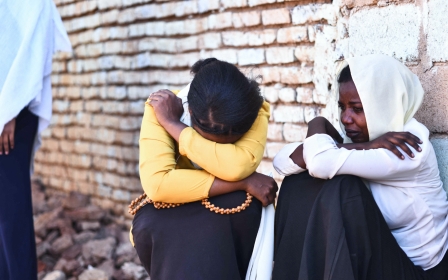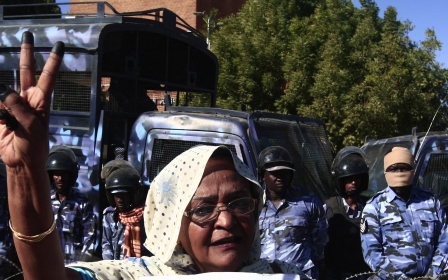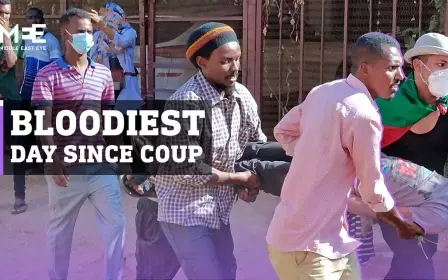Sudan coup: PM Hamdok's popularity tested after compromise with military
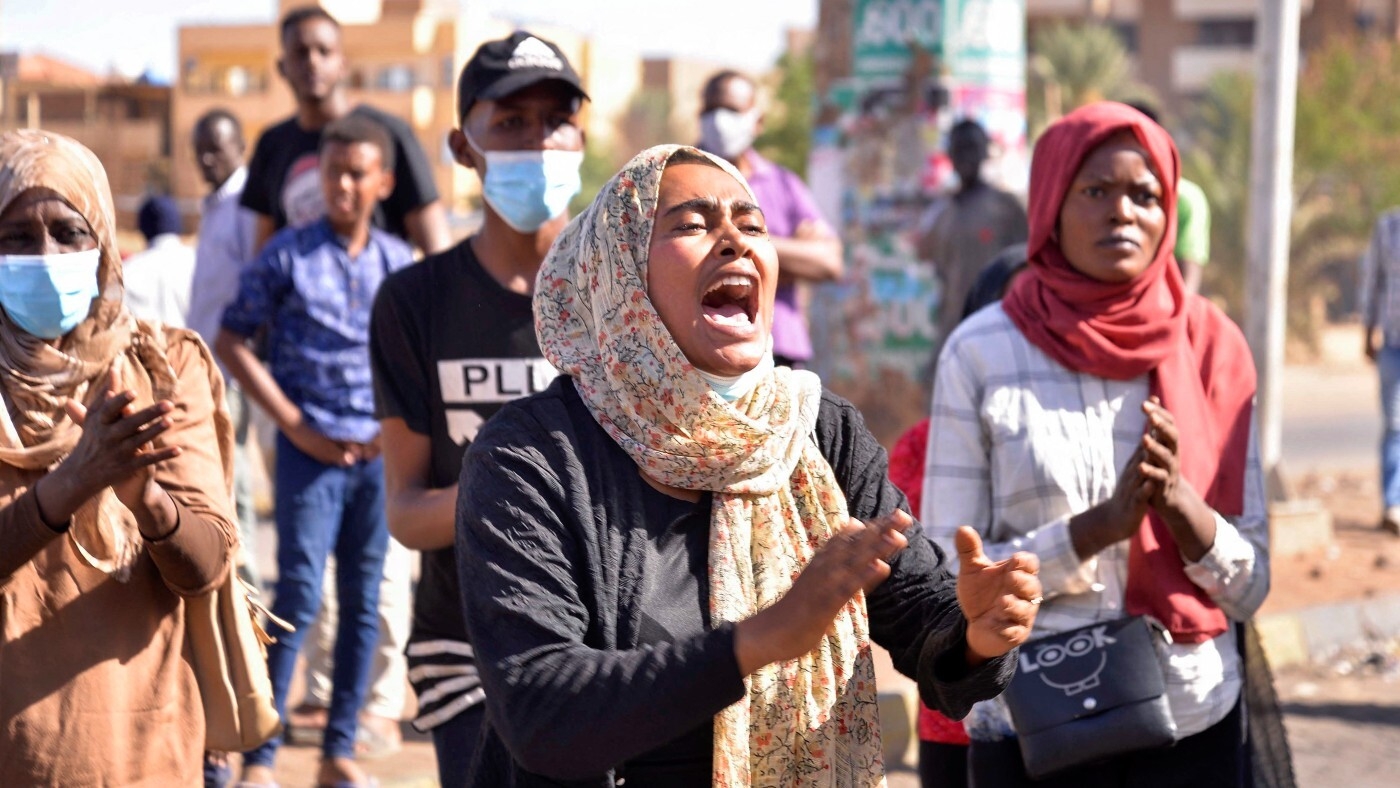
Sudanese Prime Minister Abdalla Hamdok is facing a popular backlash on the streets and among political groups that backed him previously after he made a deal with the military to reinstate him as prime minister.
The announcement followed weeks of deadly unrest in the wake of the 25 October coup that had seen a surge of popular support for the deposed premier.
The political breakthrough comes as mass demonstrations - organised by the resistance committees and the Sudanese Professional Association (SPA) - continued on Sunday, rejecting the deal and the military coup.
Sunday’s protests were notable as many political parties, including the former ruling coalition of the Forces for Freedom and Change (FFC), which had strongly supported Hamdok after he was ousted, have also rejected the agreement.
The deal, which included the release of political detainees and the formation of an independent cabinet of technocrats, is expected to face challenges: particularly on the creation of transitional institutions, the position of the army, and even the formation of a new sovereign council.
New MEE newsletter: Jerusalem Dispatch
Sign up to get the latest insights and analysis on Israel-Palestine, alongside Turkey Unpacked and other MEE newsletters
Surprise move
Hamdok’s popularity had increased since the military coup that placed him under effective house arrest, ousted his government, and led to a wave of mass street protests during which 41 demonstrators have been killed, according to medical sources.
News of the deal with the military on Sunday morning came as a shock to the protesters who have raised pictures of Hamdok in the streets, graffitied his name on walls, and held him up as a democratic icon over the past month.
'This political declaration by Hamdok is a big setback to our revolution...We are frustrated that Hamdok has accepted this deal'
- Ahmed al-Imam, protester
Thousands of protesters converged on the presidential palace in Khartoum, where Hamdok and Burhan were signing their “political declaration”, on Sunday. More demonstrators rallied in other cities in rejection of a deal they saw as a betrayal of the revolution that ousted longtime ruler Omar al-Bashir in October 2019.
On Sunday evening, the Central Committee of Sudanese Doctors said in a statement that a 16-year-old died after being shot in the head by security forces in the city of Omdurman.
Speaking to Middle East Eye near the presidential palace, Ahmed al-Imam, a 40-year-old protester, said the political declaration is part of the soft military coup that has dominated Sudan since 25 October.
“We are against military rule and we believe that the acceptance of this political declaration by Hamdok is a big setback to our revolution,” he said.
“We are frustrated that Hamdok has accepted this deal.”
Mudawi Ibrahim, a member of the mediation team that included politicians, academics, and journalists, said that the deal concluded between army generals, headed by General Abdel Fattah al-Burhan, and Hamdok, would see the premier’s return to power according to the constitutional declaration, not a decree by the army or the Sovereign Council.
“After a meeting between Hamdok and Burhan, and with our mediation, Burhan has cancelled his decision of 25 October that deposed the prime minister,” Ibrahiml, who is also a prominent academic, told MEE.
Ibrahim also confirmed that the formation of a technocratic cabinet has been authorised, as well as the release of all political detainees.
Political declaration
According to the agreement, the transitional period will continue until the general elections in 2023.
The political declaration also includes: Hamdok’s reinstatement as prime minister; the adoption of the constitutional declaration signed in August 2019; the implementation of the Juba Peace Agreement; the formation of transitional institutions, including the legislative assembly, commissions, and the constitutional court; and the appointment of the general attorney and chief of justice.
Addressing a ceremony in Khartoum, Hamdok stressed that the political declaration can set the path of the revolution and the transition.
“The insistence of the Sudanese people to correct the path of the transition is the guarantee to immunise the transition from any setbacks,” he said.
Meanwhile, Burhan said that the agreement is the first step to solving the crises dogging the transitional period, adding that the transition would be carried by dialogue between the different political parties and the military.
Rejecting the military
The United Nations welcomed the deal but called for the protection of “the constitutional order to safeguard the basic freedoms of political action, freedom of speech and peaceful assembly".
On Khartoum’s streets, meanwhile, protesters on Sunday marched downtown, raising anti-army slogans and banners rejecting the dominance of the military.
SPA spokesman Wali Ali told MEE that the association is determined to continue with the protests calling for full civilian rule and an end to the military rule of the country.
'We have nothing to do with any compromises with the military and we refuse any kind of deal or power-sharing with the army'
- Wali Ali, SPA spokesman
“We have nothing to do with any compromises with the military and we refuse any kind of deal or power-sharing with the army, so we are pressing forward with the popular rejection of this coup,” he emphasised.
The resistance committee has also strongly criticised the “political declaration”, describing it as paving the way to military rule in Sudan.
The Forces for Freedom and Change, as well as other political parties, such as the National Umma Party, also rejected the political declaration and have boycotted the signing of the political declaration.
FFC leading member Bushra al-Saim described Hamdok’s step as a "treason against the demands of the revolution".
“Burhan was looking for recognition through Hamdok’s reinstatement. Hamdok chose the side of the coup leaders, which means he does not care about the thousands of Sudanese who are on the streets protesting the coup,” she said.
A Sudanese political analyst, who asked for anonymity because he is not authorised to talk to the press, warned that the current situation would not solve the political crisis in the country.
He said Hamdok’s step was a “political suicide”.
“This mediation and political declaration will not solve the crisis and the premier’s popularity will sharply decline after what happened, which will push him to depend on the force of the army to rule,” he said.
“History has repeated itself as the power-sharing with the army will not lead to democratic transformation in the end, exactly as we saw in August 2019.
“We also need to review the dependence on external mediations, which are actually looking only for their interests and not necessarily the Sudanese demands.”
This article is available in French on Middle East Eye French edition.
Middle East Eye delivers independent and unrivalled coverage and analysis of the Middle East, North Africa and beyond. To learn more about republishing this content and the associated fees, please fill out this form. More about MEE can be found here.


